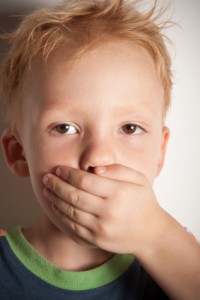The Cluttered Speaker
As children grow, they develop fluency in their native tongues. Fluency refers to the typical flow of speech. Children with a fluency disorder often display prolonged speech sounds and word repetitions. Stuttering is one widely recognized fluency disorder; cluttering is another. These two disorders may be considered to be “cousins.” To the untrained ear, it can be difficult to distinguish these two fluency disorders.
Similarities
There are some similarities that clutterers and stutterers share. The onset of speech may be delayed in young children with either of these disorders; however, this is much more common in clutterers than in stutterers. Both of these fluency disorders can negatively affect the intelligibility of the speech. That is, parents and others may have trouble understanding what the child is trying to say.
Differences
However, unlike stutterers who frequently suffer anxiety while trying to communicate, cluttered speakers are often unaware that their speech is atypical, and so they do not experience anxiety. If a person cautions a stutterer to slow down, the stutterer will likely become more anxious and the stutter will become more noticeable. Telling a clutterer to slow down, on the other hand, has the opposite effect. The cluttered speaker will usually be able to improve his speech once he is aware of the situation.
Typical Symptoms
Parents may notice other typical signs of a cluttered speaker. The cluttered speaker may not appear as though he knows exactly what he wants to say. He may often revise his speech. For example, he may state that he wants a chocolate ice cream cone, then change his choice to a vanilla ice cream cone, and then change his selection yet again. Repetition can also occur. Instead of repeating single syllables, like a stutterer, the clutterer will often repeat whole words. In addition, cluttered speakers often try to speak very quickly, which can make the speech sound slurred.
Cluttering is not as common as stuttering or other speech disorders like articulation disorders. Because of this, parents can best help their children by enlisting the help of a speech-language pathologist (SLP) who specializes in cluttering. If an SLP with this specialty is not available, the next best thing is to find an SLP who specializes in stuttering.
Treatment
The speech therapist will likely begin treating a cluttered speaker by working on his rate of speech. Reducing the rate of speech can often greatly improve intelligibility. The child may be taught to deliberately pause between words. Sometimes, a delayed auditory feedback (DAF) device is useful. This enables the child to speak into a microphone and hear his words in a headphone a split second later. The speech therapist may also work with the child on his pronunciation by instructing him to practice simple, short sentences. For example, your child might practice saying: “Hello. My name is Michael. I have a dog.”
You can help your child improve his communication between speech therapy sessions. Instruct all members of the household to speak slowly around the child and to carefully articulate each word. Instead of telling your child that he is speaking too quickly, consider using a nonverbal signal. For example, you could tap your lips with a finger. This helps your child become more aware of his rate of speech without the burden of being interrupted frequently.





